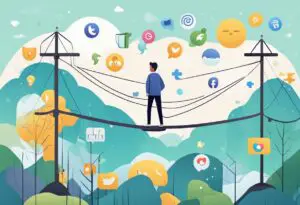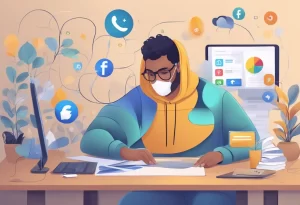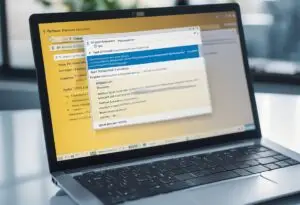Mindful Social Media: How To Protect Your Mental Health Online
How To Balance Social Media And Mental Health - Expert Tips

Balance Social Media has revolutionized the way people interact with each other, both personally and professionally. However, the rise of social media has also brought a new set of challenges, particularly when it comes to mental health. Spending too much time on social media can lead to feelings of anxiety, depression, and loneliness, and can even exacerbate existing mental health conditions. Therefore, it is important to learn how to balance social media use with taking care of one’s mental health.

Credit: Youtube
Understanding the impact of social media on mental health is the first step towards finding a healthy balance. Research has shown that social media can negatively affect mental health by increasing the risk of anxiety, depression, and loneliness. However, social media can also have positive effects, such as providing a sense of connection and community. Recognizing the signs of social media addiction is also important, as excessive use can lead to negative consequences such as sleep disturbances, decreased productivity, and strained relationships.
Key Takeaways
- Spending too much time on social media can negatively affect mental health.
- Recognizing the signs of social media addiction is important.
- Balancing social media use with taking care of one’s mental health is crucial.
The Impact Of Social Media On Mental Health
Social media has become a ubiquitous part of modern life, with billions of people using platforms like Facebook, Instagram, and Twitter to connect with others, share their thoughts and experiences, and consume content. While social media can have many benefits, such as helping people stay in touch with friends and family, it can also have a negative impact on mental health.
The Connection Between Balance Social Media And Anxiety
One of the most significant ways that social media can impact mental health is by contributing to anxiety. Studies have shown that people who spend more time on social media are more likely to experience anxiety and other negative emotions. This may be because social media can create a sense of pressure to constantly present a perfect image of oneself, leading to feelings of inadequacy and self-doubt.
Additionally, social media can lead to a phenomenon known as “FOMO,” or fear of missing out. Seeing other people’s highlight reels on social media can make people feel like they are missing out on fun experiences or that their own lives are less exciting by comparison. This can contribute to feelings of anxiety and depression.
Effects Of Social Media On Self-Esteem
Social media can significantly affect self-esteem, often presenting curated glimpses of ‘perfect’ lives that can lead to feelings of inadequacy. The constant comparison facilitated by social media can undermine self-worth, as users may feel they are falling short compared to their peers. While social media offers valuable connections, it’s crucial to be aware of its potential to distort reality and negatively impact mental well-being. Being mindful of the curated content on social media can help mitigate feelings of inadequacy and foster a healthier self-image. In an age of constant connectivity, it’s essential to strike a balance between engagement and self-care to protect mental health.
Recognizing The Signs Of Social Media Addiction
Social media addiction is a growing concern and can have negative impacts on mental health. It is important to recognize the signs of social media addiction to avoid long-term negative effects. Here are some common signs to look out for:
1. Spending excessive time on social media
One of the most obvious signs of social media addiction is spending excessive amounts of time on social media platforms. This can include spending hours scrolling through social media feeds, checking notifications and messages, and constantly refreshing social media pages.
2. Neglecting responsibilities
Individuals with social media addiction may neglect their responsibilities in favor of spending time on social media. This can include neglecting work or school assignments, household chores, and personal relationships.
3. Using social media to cope with negative emotions
Another sign of social media addiction is using social media as a way to cope with negative emotions. This can include using social media to distract oneself from negative emotions or to seek validation from others.
4. Feeling anxious or irritable when unable to access social media
Individuals with social media addiction may feel anxious or irritable when they are unable to access social media. This can include feeling restless or agitated when their phone battery dies or when they do not have access to Wi-Fi.
5. Neglecting self-care
Social media addiction can also lead to neglecting self-care. This can include neglecting physical health by not exercising or eating properly, as well as neglecting mental health by not seeking support or engaging in self-care activities.
It is important to recognize these signs of social media addiction and take steps to address them. Seeking support from a mental health professional or limiting social media use can be effective ways to manage social media addiction.
Strategies For Balancing Social Media Use
People use social media for various reasons, including staying connected with friends and family, sharing experiences, and entertainment. However, excessive social media use can negatively impact mental health and lead to issues such as anxiety, depression, and loneliness. To maintain a healthy balance, it is essential to adopt strategies for balancing social media use.
Setting Boundaries For Social Media Use
One way to balance social media use is by setting boundaries. Establishing limits on the amount of time spent on social media can help reduce the negative effects on mental health. Individuals can set a specific time limit for social media use each day or week. They can also choose to disable notifications for social media apps to avoid constant interruptions.
Another way to set boundaries is by creating rules for social media use. For example, individuals can decide to avoid social media during meals or before bed. They can also choose to limit social media use to specific times of the day, such as during breaks or after work.
Digital Detox: Taking Social Media Breaks
Taking a break from social media can also help individuals balance their social media use. A digital detox involves taking a break from social media for a specific period, such as a day, a week, or a month. During this time, individuals can focus on other activities, such as reading, exercising, or spending time with loved ones.
A digital detox can also help individuals re-evaluate their relationship with social media and identify any negative effects it may have on their mental health. It can also help individuals develop healthier habits and routines for social media use.
Mindful Social Media Use
Mindful social media use involves being intentional and aware of social media use. It involves paying attention to how social media use affects mental health and taking steps to minimize negative effects.
One way to practice mindful social media use is by being selective about the content consumed on social media. Individuals can choose to follow accounts that promote positivity, inspiration, and education. They can also choose to unfollow or mute accounts that promote negativity, drama, or trigger negative emotions.
Another way to practice mindful social media use is by being aware of how social media use affects mental health. Individuals can take note of how they feel before and after using social media and adjust their social media use accordingly. They can also practice self-care activities, such as meditation, exercise, or spending time in nature, to counteract any negative effects of social media use.
In conclusion, balancing social media use is essential for maintaining good mental health. Strategies such as setting boundaries, taking social media breaks, and practicing mindful social media use can help individuals maintain a healthy balance and minimize negative effects on mental health.
Implementing Healthy Social Media Habits

Social media is a powerful tool that can either positively or negatively impact one’s mental health. Therefore, it is essential to implement healthy social media habits to maintain a healthy relationship with social media. Here are some healthy social media habits that can help:
Engaging In Positive Online Communities
Engaging in positive online communities can be an excellent way to balance social media and mental health. Positive online communities can provide support, encouragement, and motivation. They can also help individuals feel less isolated and more connected to others who share similar interests and experiences.
To find positive online communities, individuals can search for groups or pages that align with their interests or hobbies. For instance, if one is interested in fitness, they can join a fitness group where they can share their fitness journey, ask for advice, and receive support from other members.
Limiting Social Media Notifications
Limiting social media notifications can help individuals reduce their screen time and avoid distractions. Social media notifications can be overwhelming, and they can cause individuals to feel anxious or stressed. Therefore, limiting notifications can help individuals take control of their social media usage and prevent it from interfering with their daily activities.
Individuals can limit social media notifications by turning off notifications for non-essential apps or muting notifications during specific hours of the day. This way, they can check their social media accounts on their own time without feeling pressured or distracted.
In conclusion, implementing healthy social media habits is crucial for maintaining a healthy relationship with social media. Engaging in positive online communities and limiting social media notifications are two healthy social media habits that individuals can adopt to balance social media and mental health.
Seeking Professional Help When Needed

While there are many ways to balance social media and mental health, sometimes professional help is needed to address underlying issues. It’s important to recognize when social media use is negatively impacting mental health and seek help when necessary.
Some signs that it may be time to seek professional help include:
- Prolonged feelings of sadness or hopelessness
- Loss of interest in activities that were once enjoyable
- Difficulty sleeping or excessive sleeping
- Changes in appetite or weight
- Difficulty concentrating or making decisions
- Thoughts of self-harm or suicide
If any of these symptoms persist for a prolonged period of time, it’s important to seek help from a mental health professional.
There are a variety of mental health professionals who can provide support and treatment, including:
- Psychiatrists: Medical doctors who specialize in mental health and can prescribe medication.
- Psychologists: Professionals who specialize in diagnosing and treating mental health disorders through therapy.
- Social Workers: Professionals who provide counselling and support services to individuals and families.
- Counsellors: Professionals who provide guidance and support for individuals struggling with mental health issues.
It’s important to find a professional who is a good fit and who can provide the necessary support and treatment. This may involve trying out a few different professionals before finding the right one.
Overall, seeking professional help is an important step in balancing social media use and maintaining good mental health.
Conclusion
In conclusion, social media has become an integral part of modern life, and its impact on mental health cannot be ignored. While social media can provide a sense of connection, it can also lead to increased stress, anxiety, and depression. Therefore, it is important to strike a balance between social media use and mental well-being.
One way to achieve this balance is to limit social media use to a specific time of day. This can help prevent excessive use and allow for more time to focus on other activities. Another strategy is to use social media mindfully, being aware of how it affects mood and mental health. This can involve unfollowing accounts that trigger negative emotions or setting boundaries around social media use.
It is also important to recognize the potential benefits of social media, such as access to support groups and educational resources. However, it is crucial to approach social media use with caution and to prioritize mental health and well-being.
Overall, finding a balance between social media use and mental health requires self-awareness, mindfulness, and intentional effort. By taking steps to limit social media use and prioritize mental health, individuals can reap the benefits of social media while minimizing its negative impacts.

I am a technology writer and blogger based in the USA. I have over 5 years of experience writing about the latest trends and innovations in the tech industry, with a focus on topics like artificial intelligence, cybersecurity, and social media.



